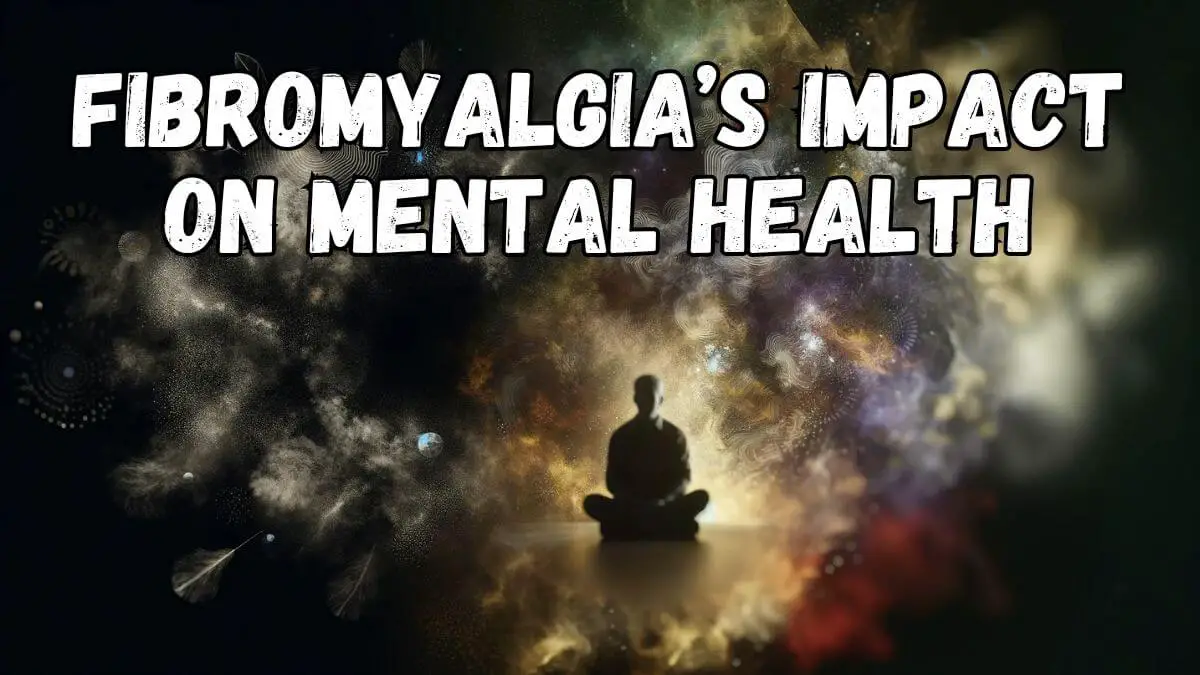Fibromyalgia’s Impact on Mental Health
When it comes to fibromyalgia’s impact on mental health, I can tell a lot about the subject. My wife suffers from stage 4 deep infiltrating endometriosis but the following year of her diagnosis of endometriosis, she was diagnosed with fibromyalgia.
So, when it comes to fibromyalgia and mental health impact, here’s what you need to know in a nutshell…
Fibromyalgia, a chronic condition characterized by widespread pain and fatigue, can significantly impact mental health. It’s associated with an increased risk of anxiety, depression, and stress-related disorders due to persistent pain and sleep disturbances. Effective management includes a combination of medication, therapy, and lifestyle adjustments to alleviate symptoms and improve quality of life.
Now, scroll down for more in-depth information.
- Fibromyalgia's Impact on Mental Health
- Understanding Fibromyalgia
- Fibromyalgia and Depression
- Anxiety and Fibromyalgia
- Cognitive Difficulties and Fibromyalgia
- Impact on Daily Functioning
- Treatment Options
- Support for Fibromyalgia and Mental Health
- The Controversy Surrounding Fibromyalgia
- The Importance of Addressing Mental Health in Fibromyalgia
- Finding Hope with Fibromyalgia
- Source Links for Fibromyalgia's Impact on Mental Health
Fibromyalgia’s Impact on Mental Health
Fibromyalgia is a chronic pain disorder that affects approximately 2-4% of Americans, with more women being affected than men. While the exact cause of fibromyalgia is unknown, it is believed to be a disorder of the central nervous system. In addition to physical symptoms such as widespread pain and sensitivity to touch, fibromyalgia can also have a significant impact on mental health.
Studies have shown that individuals with fibromyalgia are three times more likely to experience depression than the general population. Other psychological symptoms associated with fibromyalgia include anxiety, cognitive difficulties, and mood changes. It is important to address both the physical and mental health aspects of fibromyalgia in order to effectively manage the condition and improve quality of life.
If you want to learn more about fibromyalgia, I wrote a “Fibromyalgia for Caring Partners” e-Book.
You can get the 3 First Chapters of the e-Book for FREE, and if you like it, you’ll get a Whopping 33% Discount on the Whole Book, plus discounts on other helpful tools. You have nothing to lose but a lot to gain.
These chapters alone explain how to accept the new normal, and understand fibromyalgia, and its diagnosis. They include:
- The new you.
- The new her.
- The new reality.
- Introduction to fibromyalgia.
- What is fibromyalgia?
- The early days.
- When you first realize something is wrong.
- Spotting the signs that something is wrong.
- Coming to terms with a chronic illness.
- The role of partner in fibromyalgia.
- The process of getting diagnosed.
Get Your 3 FREE Chapters!
Fibromyalgia for Caring Men

Understanding Fibromyalgia
Fibromyalgia is a chronic pain condition that affects people of all ages, with a higher prevalence in women than men. It is characterized by widespread pain throughout the body, along with other symptoms such as fatigue, sleep disturbances, cognitive difficulties (referred to as “brain fog”), and gastrointestinal issues. The exact cause of fibromyalgia is still unknown, but it is believed to be a disorder of the central nervous system rather than a disease of the autoimmune, inflammation, joint, or muscle systems.
One of the key features of fibromyalgia is the presence of tender points, which are specific areas of the body that are particularly sensitive to touch. These tender points can vary from person to person but are often found in areas such as the neck, shoulders, chest, hips, and knees.
It is important to note that fibromyalgia is not just limited to physical pain. Individuals with fibromyalgia may also experience a range of other symptoms that can significantly impact their quality of life. These can include:
- Chronic fatigue
- Disturbed sleep patterns
- Cognitive difficulties, such as problems with memory, concentration, and attention
- Gastrointestinal issues, such as irritable bowel syndrome
Fibromyalgia can affect people of all ages, including teenagers, although it is more commonly diagnosed in middle-aged individuals. The exact reasons why some people develop fibromyalgia are still unclear, and there is ongoing research to better understand the condition and develop effective treatment strategies.
Fibromyalgia and Depression
Depression is a common symptom associated with fibromyalgia, affecting individuals with the condition at a rate three times higher than the general population. While the exact relationship between fibromyalgia and depression is still not fully understood, it is widely recognized that the presence of depression can significantly impact the quality of life for those living with fibromyalgia.
Research has shown that individuals with fibromyalgia may experience depression as a result of the physical and emotional burden of the condition. The chronic pain, fatigue, and sleep disturbances associated with fibromyalgia can contribute to feelings of hopelessness, sadness, and despair, leading to the development or worsening of depressive symptoms.
Conversely, it is also possible that individuals with fibromyalgia have a greater predisposition to depression due to shared underlying risk factors or biological mechanisms. The relationship between fibromyalgia and depression is complex and likely multifactorial, involving both genetic and environmental factors.
Regardless of the exact cause, addressing depression is crucial in the comprehensive management of fibromyalgia. By treating depression symptoms, healthcare providers can help alleviate the emotional distress experienced by individuals with fibromyalgia and improve overall well-being.
In addition to pharmacological interventions such as antidepressant medications, therapy can play a crucial role in the treatment of depression in individuals with fibromyalgia. Cognitive-behavioral therapy (CBT), for example, has been shown to be effective in helping individuals identify and change negative thought patterns, develop coping strategies, and improve overall psychological well-being.
Taking a holistic approach to fibromyalgia management, healthcare providers should address both the physical and mental health aspects of the condition. By providing comprehensive care and support, individuals with fibromyalgia can better navigate the challenges of living with the condition and experience improved quality of life.

Common Symptoms of Fibromyalgia and Depression
By recognizing and addressing the link between fibromyalgia and depression, individuals with the condition can receive the necessary support and treatment to manage both physical and mental health symptoms effectively. Healthcare providers play a vital role in facilitating comprehensive care and improving the overall well-being of those living with fibromyalgia.
| Fibromyalgia | Depression |
|---|---|
| Widespread pain | Sadness or depressed mood |
| Tender points | Loss of interest or pleasure |
| Fatigue | Feeling of worthlessness or guilt |
| Sleep disturbances | Changes in appetite or weight |
| Cognitive difficulties (brain fog) | Difficulty concentrating or making decisions |
| Anxiety | Restlessness or slowed movements |
Anxiety and Fibromyalgia
Anxiety is another common psychological symptom associated with fibromyalgia. People with fibromyalgia often experience heightened levels of anxiety, which can manifest as excessive worry, restlessness, irritability, and difficulty in relaxing.
The presence of anxiety can further contribute to the overall burden of the condition and affect your ability to cope with daily life. It can make it challenging to manage pain, engage in activities, and maintain relationships. Recognizing and addressing anxiety symptoms is essential for effectively managing fibromyalgia and improving your quality of life.
Understanding Anxiety Symptoms in Fibromyalgia
Anxiety symptoms in fibromyalgia can vary from person to person. Some common experiences include:
- Excessive worrying: Feeling overwhelmed by irrational thoughts and concerns.
- Restlessness: Being unable to sit still or relax due to nervousness or the constant need to be on edge.
- Irritability: Feeling easily agitated, snapping at others, or having a low tolerance for stress.
- Difficulty in relaxing: Struggling to unwind and find a sense of calm or peace.
These symptoms can significantly impact your well-being and make it harder to manage the physical symptoms of fibromyalgia. By identifying and addressing anxiety symptoms, you can improve your overall well-being and enhance your ability to cope with fibromyalgia.
Effective management strategies for anxiety in fibromyalgia may include:
- Stress reduction techniques, such as deep breathing exercises, mindfulness, and meditation.
- Regular physical activity, which can help reduce anxiety and improve mood.
- Talking to a mental health professional who specializes in anxiety disorders and can provide support and guidance.
- Participating in support groups, where you can connect and share experiences with others facing similar challenges.
Remember that addressing anxiety symptoms is an essential part of managing fibromyalgia and improving your overall well-being. Don’t hesitate to seek professional help and explore various strategies to find the best approach for you.

Cognitive Difficulties and Fibromyalgia
Cognitive difficulties, commonly referred to as “brain fog,” are frequently experienced by individuals with fibromyalgia. These difficulties can manifest as problems with memory, concentration, and attention, making it challenging to perform daily tasks and engage in activities requiring mental focus. The exact cause of cognitive difficulties in fibromyalgia is not fully understood, but it is believed to be related to the central nervous system dysfunction associated with the condition.
Managing cognitive difficulties in fibromyalgia may involve implementing various strategies:
- Pacing activities: Breaking tasks into smaller, manageable segments can help conserve mental energy and reduce cognitive overload.
- Using organizational tools: Implementing calendars, to-do lists, and reminders can assist in keeping track of responsibilities and commitments.
- Practicing stress-reduction techniques: Engaging in activities such as meditation, deep breathing exercises, or mindfulness can help reduce stress levels, which may improve cognitive function.
It’s essential for individuals with fibromyalgia to develop coping mechanisms that work best for their unique cognitive challenges. By employing these strategies, individuals can enhance their ability to navigate daily life and effectively manage the cognitive difficulties associated with fibromyalgia.
Impact on Daily Functioning
Fibromyalgia can have a significant impact on daily functioning and quality of life. The combination of physical and mental symptoms can make it challenging for individuals to perform everyday tasks, maintain employment, and engage in social activities.
Effective management strategies for fibromyalgia include:
- Medication
- Physical therapy
- Cognitive behavioral therapy
- Lifestyle modifications
By combining these approaches, individuals with fibromyalgia can better manage their symptoms and improve overall functioning and well-being. Medications, such as pain relievers and antidepressants, can help reduce pain, improve sleep, and alleviate psychological symptoms.
Physical therapy techniques, such as gentle exercises, stretches, and massage, can help manage pain, increase flexibility, and improve muscle strength. These strategies can be tailored to individual needs and may involve gradual exercise programs, hydrotherapy, and assistive devices for daily activities.
Cognitive behavioral therapy (CBT) is a type of therapy that focuses on changing negative thoughts and behavior patterns to improve coping skills. CBT can help individuals with fibromyalgia identify and challenge unhelpful beliefs, develop healthy strategies for managing pain and stress, and improve overall mental well-being.
Lifestyle modifications, such as adopting a balanced diet, incorporating regular exercise, practicing stress management techniques, and getting enough restful sleep, can also play a crucial role in managing fibromyalgia symptoms.
Educating individuals with fibromyalgia about self-management techniques and providing support for coping with the condition is essential. It empowers individuals to take an active role in their own care, make informed decisions, and adapt their daily routines to minimize the impact of fibromyalgia on their daily lives.
By implementing these strategies, individuals with fibromyalgia can regain control over their daily activities, improve their physical and mental well-being, and enhance their overall quality of life.

Treatment Options
Treating fibromyalgia requires a comprehensive approach that addresses the physical and mental aspects of the condition. There are several treatment options available to help manage fibromyalgia symptoms and improve overall quality of life.
Medications
Medications can play a crucial role in managing fibromyalgia. Antidepressant medications, such as selective serotonin reuptake inhibitors (SSRIs) and serotonin-norepinephrine reuptake inhibitors (SNRIs), have been found to provide relief for fibromyalgia symptoms.
These medications help regulate neurotransmitter levels in the brain, which can help reduce pain and improve mood. Additionally, certain medications that affect the central nervous system may be prescribed to manage specific symptoms, such as sleep disturbances and fatigue.
Cognitive Behavioral Therapy (CBT)
Cognitive behavioral therapy is a type of therapy that focuses on identifying and changing negative thought patterns and behaviors. CBT has been shown to be effective in helping individuals with fibromyalgia cope with pain and manage associated mental health symptoms, such as depression and anxiety. Through CBT, individuals learn new strategies and coping skills to better manage their condition and improve their overall well-being.
Physical Therapy
Physical therapy can be an important component of fibromyalgia management. A physical therapist can design a personalized exercise program to help improve strength, flexibility, and overall physical function. Additionally, physical therapy techniques such as massage, heat therapy, and gentle stretching can help alleviate pain and promote relaxation.
Relaxation Techniques
Relaxation techniques, such as deep breathing exercises, meditation, and progressive muscle relaxation, can help individuals with fibromyalgia manage stress and reduce pain. These techniques can be practiced regularly to promote relaxation and improve overall well-being.
Lifestyle Modifications
Making certain lifestyle modifications can also contribute to fibromyalgia management. Regular exercise, such as low-impact activities like walking or swimming, can help improve physical function and reduce pain. Additionally, practicing stress management techniques, such as mindfulness and engaging in enjoyable activities, can positively impact mental health and overall well-being.
Implementing a combination of these treatment options, as guided by healthcare professionals, can provide comprehensive support for individuals with fibromyalgia. It is important to work closely with a healthcare team to develop a personalized treatment plan that addresses both the physical and mental health aspects of the condition.
Support for Fibromyalgia and Mental Health
Living with fibromyalgia and managing the associated mental health challenges can be quite challenging. It is important for individuals with fibromyalgia to seek support from healthcare professionals, support groups, and loved ones who can provide understanding, validation, and practical advice. Participating in support groups or engaging in therapy can also be beneficial for addressing the emotional impact of fibromyalgia and learning effective coping strategies.
If you are dealing with fibromyalgia, reaching out for mental health support is crucial. Healthcare professionals, such as therapists or counselors specializing in chronic pain conditions, can help you navigate the emotional impact of fibromyalgia and provide strategies to better cope with the challenges it presents.
Support groups, whether in-person or online, can be a valuable source of understanding and validation. Connecting with individuals who are going through similar experiences can provide you with a sense of belonging and an opportunity to share coping strategies and tips for living with fibromyalgia.
Remember, you don’t have to face fibromyalgia alone. Reach out to your healthcare team, explore support group options, and lean on the support of your loved ones. Together, you can navigate the challenges of fibromyalgia and find effective ways to manage both the physical and mental aspects of the condition.
But you must remember these key takeaways:
- Seek support from healthcare professionals, support groups, and loved ones
- Participate in therapy or counseling to address the emotional impact of fibromyalgia
- Connect with support groups for understanding, validation, and coping strategies
- Remember, you don’t have to face fibromyalgia alone

Types of Support for Fibromyalgia
| Type of Support | Description |
|---|---|
| Healthcare Professionals | Seek guidance from healthcare professionals specializing in chronic pain and mental health |
| Support Groups | Connect with individuals experiencing similar challenges through in-person or online support groups |
| Therapy or Counseling | Participate in therapy or counseling to address the emotional impact of fibromyalgia and learn coping strategies |
| Family and Friends | Lean on the support of your loved ones for understanding and validation |
The Controversy Surrounding Fibromyalgia
There is ongoing controversy within the medical community regarding fibromyalgia. Some physicians believe that fibromyalgia is a purely psychological condition, while others argue that it is a true physical disease. The lack of a specific diagnostic test for fibromyalgia and the overlap of symptoms with other physical and psychological conditions contribute to this debate.
However, research has shown that fibromyalgia is associated with distinct physical symptoms, neurohormonal changes, and abnormalities in pain processing, supporting its recognition as a legitimate medical condition.
The Importance of Addressing Mental Health in Fibromyalgia
With the high prevalence of depression, anxiety, and cognitive difficulties in individuals with fibromyalgia, it is crucial to address mental health as part of the overall management of the condition. Research has shown that addressing mental health symptoms can lead to improved pain management, enhanced quality of life, and better functional outcomes for individuals with fibromyalgia.
Providing comprehensive care that incorporates both physical and mental health interventions can help individuals with fibromyalgia better manage their symptoms and improve overall well-being.
Finding Hope with Fibromyalgia
To wrap up fibromyalgia’s impact on mental health, living with fibro and managing the associated mental health challenges can be a difficult journey, but it’s important to remember that you are not alone. Seeking the support of a healthcare provider who understands and specializes in fibromyalgia can make a significant difference in the quality of care you receive. They can help you navigate the complexities of this condition and tailor a treatment plan to address your unique needs.
Beyond medical intervention, connecting with support groups can provide an invaluable source of validation, understanding, and peer support. Sharing your experiences and learning from others who are also living with fibromyalgia can help you feel less isolated and more empowered to face the challenges that come your way. These groups can provide practical advice, emotional support, and a sense of community that can be comforting and uplifting.
In addition to seeking external support, don’t underestimate the power of self-care practices. Taking care of your physical and mental well-being plays a crucial role in managing fibromyalgia. Engaging in activities that bring you joy, practicing relaxation techniques, prioritizing sleep, and maintaining a healthy lifestyle can all contribute to your overall well-being. Remember to listen to your body and pace yourself, as pushing yourself too hard can worsen symptoms.
With the right support and management strategies in place, you can find hope and improve your overall well-being while living with fibromyalgia. It may take time to find the right combination of treatments, self-care practices, and support networks that work for you, but perseverance and staying proactive are key. Embrace the strength within you, reach out for support, and know that there is hope for a brighter future.


About Me
Hi, I’m Lucjan! The reason why I decided to create this blog was my beautiful wife, who experienced a lot of pain in life, but also the lack of information about endometriosis and fibromyalgia for men…
